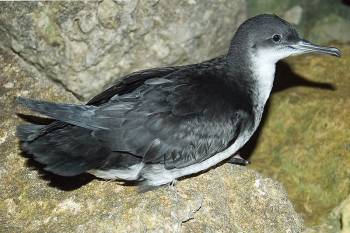Steffen Oppel (RSPB) and colleagues writing in the journal Biological Conservation have looked at the conservation status of the Near Threatened Yelkouan Shearwater Puffinus yelkouan (a potential candidate ACAP species) at French and Maltese colonies in the eastern Mediterranean.
The paper's abstract follows:
"Many seabird species are experiencing population declines, with key factors being high adult mortality caused by fishery by-catch and predation by introduced predators on nesting islands. In the Mediterranean, both of these pressures are intensive and widespread. We studied the adult survival of an endemic Mediterranean seabird, the Yelkouan shearwater (Puffinus yelkouan), between 1969-1994 and 2007-2010 in Malta and between 2004-2010 in France using mark-recapture methods. Mean annual survival probabilities for breeding adults were below 0.9 for all colonies and periods. Between 1969-1994, annual survival for adults of unknown breeding status was on average 0.74 (95% confidence interval: 0.69-0.80) in Malta, possibly as a result of various human disturbances (including illegal shooting), light pollution and fisheries by-catch. Over the period 2004-2010, we found strong support for variation in adult survival probabilities between breeders and non-breeders, and islands with and without introduced predators in France. Survival probabilities for non-breeders (0.95, 0.81-1.0) appeared to be higher than for breeders (0.82, 0.70-0.94), but were imprecise partly due to low recapture probabilities. In Malta, we found evidence for heterogeneity in survival probabilities between two unknown groups (probably breeders and non-breeders), and seasonal variation in survival probability. Birds were more likely to survive the period including the peak breeding season than an equally long period during which they roam widely at sea. Although annual adult survival probability was still low (0.85, 0.58-1.0), colony protection measures appear to have reduced mortality at nesting cliffs. A population model indicated that colonies in France and Malta would currently require continuous immigration of 5-12 pairs per year to maintain stable populations. Our estimates of adult survival probabilities over the past four decades are consistent with overall population declines. Threats to Yelkouan shearwaters require immediate management actions to avoid ongoing population declines in the western Mediterranean."
Reference:
Oppel, S., Raine, A.F., Borg, J.J., Raine, H., Bonnaud, E., Bourgeois, K. & Breton, A.R. in press. Is the Yelkouan shearwater Puffinus yelkouan threatened by low adult survival probabilities? Biological Conservation doi:10.1016/j.biocon.2011.05.017.
John Cooper, ACAP Information Officer, 11 July 2011

 English
English  Français
Français  Español
Español 